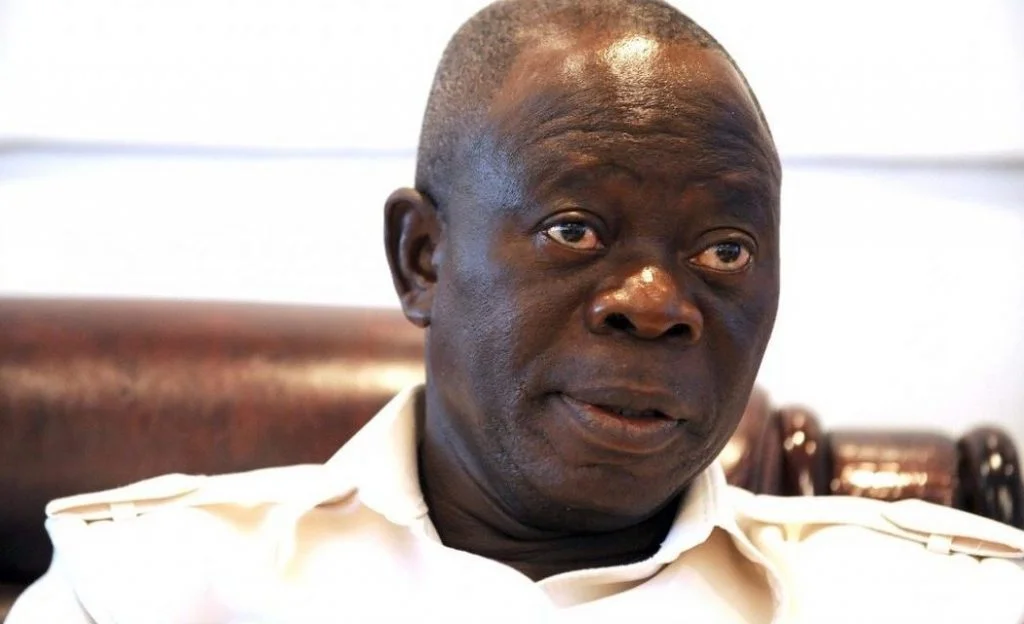The Senator representing Edo North, Adams Oshiomhole, stated on Wednesday that Nigerian workers today are significantly poorer than previous generations.
Oshiomhole stated this during a lecture for members of the Executive Intelligence Management Course 17 at the National Institute of Security Studies in Abuja.
He noted that the widely discussed N70,000 minimum wage is equivalent to just $42 when converted to dollars, a sharp decline compared to the past.
He said, “When the minimum wage in Nigeria was established under President Shagari, around 1981, it was about N125, which was equivalent to around $160 a month. Today, despite a 100% increase achieved by labour last year, the current exchange rate reduces this N70,000 to just $42.
READ ALSO: 12 States Delay N30,000 Minimum Wage Tor Teachers – Report
“So, if you divide N70,000 by N1,650, it gives you $42. This shows that working people are much, much poorer now than we were many years ago. This income devaluation affects the quality of life and everything else.”
Oshiomhole stressed that the government and wealthier states should pay more than the current minimum wage.
Reflecting on his time as President of the Nigeria Labour Congress, he recalled pushing for Lagos State to raise its minimum wage beyond N5,000.
He said, “A serious employer should not be paying the minimum wage; they should pay more. Major employers, like the civil service, should not pay just the minimum wage. I expect the Federal Government will, over time, adjust its minimum wage.
“When I was NLC President, we agreed that oil-producing states, like Delta, Bayelsa, Rivers, Akwa Ibom, and Lagos, which have significant revenue, should pay no less than N7,000—the same as the federal rate.
READ ALSO: Fubara Approves N85,000 Minimum Wage For Rivers Workers, Payments Begin November
“Interestingly, when we pursued this, the current President was then Governor of Lagos State. He showed me all the books and said he couldn’t afford it, but I had to push him. We organised strikes to make sure that all necessary funds were used for salaries, even if it meant sacrificing other projects.
“My job then was not to sympathise with the employers; it was to ensure workers got their due.”
Oshiomhole also called for the expansion of minimum wage laws to cover domestic staff and other employees through amendments.
He stated, “If you look at the law in Nigeria, which I hope we can amend soon, although the federal government and states have agreed on a N70,000 minimum wage, some employers still pay less, as the law only applies to enterprises with around 25-50 employees.
“But in today’s economy, a small ICT company with only 10 staff can still generate significant turnover, so the old employee number criteria are outdated.”
READ ALSO: FULL LIST: States Paying Above N70,000 Minimum Wage
He added that wages in other countries, such as in California, USA, may be driving the “Japa syndrome” (emigration of Nigerian workers). According to him, an unskilled worker could earn as much as $2,560 a month in California.
He explained, “If you check, the minimum wage in California is $16 an hour. Working eight hours a day amounts to $128 daily. Over a month of 20 working days, this totals $2,560 for unskilled labour, a vast difference compared to Nigerian wages.”
Expressing hope for the country’s future despite current hardships, he urged the government to carefully consider policy decisions.
He said, “We are going through challenging times, but as the saying goes, tough times don’t last; tough people do. Nigerians are tough, and this time will pass. Prosperity will return if we make the right policy choices and preserve past gains.”
